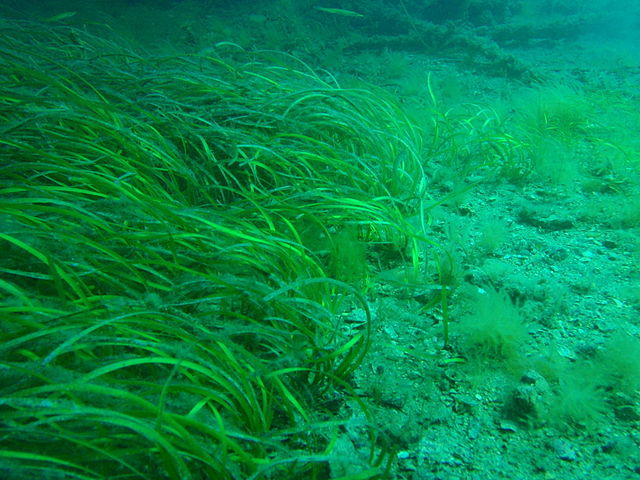
By Bhanu Agarwal, Publishing Staff Writer & Researcher for Save The Water™ | May 17, 2018
Ocean water faces many threats. One such threat is acidification, which has many harmful effects on marine species. As a result, the field of ocean acidification research is rapidly expanding.1 This research has led to better understanding of the future impacts of water acidification and natural solutions, such as sea grass.
The effects of ocean acidification
Humans are increasingly dominating the physical and chemical environment. For example, as a side effect of the industrial revolution, carbon dioxide (CO2) in the air has seeped into ocean water, thus unbalancing its pH level. Now, about one-third of the carbon dioxide that humans emit into the atmosphere dissolves in the ocean. This CO2 dissolution leads to increased seawater acidity (or ocean acidification). This acidification is an obvious problem for animals that produce a calcium carbonate shell or skeleton (such as corals, some plankton, and snails). Additionally, rising CO2 levels and ocean acidification affect the survival, growth, calcification, and reproduction of marine organisms. Ocean acidification also alters the behavior of many animals by interfering with their brain functioning.2
Other studies show ocean acidification can also change the response of fish larvae to settlement habitat sounds by deterring them rather than attracting them. Also, it affects the sounds that ocean ecosystems produce. For example, experts say that if we don’t reduce greenhouse gas emissions, rocky reefs could be much quieter in 2100 than now.3
Importance of ocean plants, including sea grass
Although ocean plants make up just 0.05 percent of the plant biomass on land, they suck up roughly the same amount of carbon every day as all land-based plants.4 As a result, sea grass meadows play an important role in ocean health. For example, they shelter important fish species, filter pollutants from seawater, and lock up huge amounts of carbon. The plants also draw fertilizer runoff and other pollutants out of the water, locking them safely away in meadow soil and wiping out pathogens.5
Researching solutions
Researchers are working to find ways to reduce acidity in the ocean with the help of growing kelp, eelgrass, and other vegetation that can absorb CO2. For example, a team of Oregon State University marine ecologists planted baby oysters around Netarts Bay. They found that the oysters protected by beds of eelgrass thrived as the plants swallow up enough CO2 to make way for oysters to grow. They are now exploring the idea that sea grass, kelps, and shell beds might be able to counteract the rising tide of ocean acidity.4 Their study showed sea grass meadows should give corals about an 18% boost in growth. Now commercial kelp farmers are teaming up with the researchers to start large scale projects to plant and grow kelp to suck up CO2 and reduce ocean acidity.4
However, sea grass meadows are one of the most endangered ecosystems on earth. As sea grass meadows disappear, carbon is being released back into the ocean. Some of it may make its way into the atmosphere as heat-trapping carbon dioxide. In recent years, Dr. Robert Orth, a sea grass expert at the Virginia Institute of Marine Science, has been working to restore sea grass off the coast of Virginia. “Now we have 2,500 hectares of sea grass, where in 1997 there wasn’t a single blade of grass,” he said.5
References
- U. Riebesell & J.-P. Gattuso. 2015. “Lessons learned from ocean acidification research.” Nature Climate Change, 5, 12–14.
- Sue-Ann Watson, Jennifer B. Fields, Philip L. Munday. 2017. “Ocean acidification alters predator behavior and reduces predation rate.” Biology Letters, The Royal Society Publishing.
- Sean Connell, Tullio Rossi & Ivan Nagelkerkan. 2016. “Humans are silencing the seas: Experts say that ocean soundscape is changing, spelling ‘bad news’ for species that depend on noise.” Daily Mail. https://dailym.ai/2ddaVXe
- Nicola Jones. 2016. “How growing sea plants can help slow ocean acidification.” Yale Environment 360. https://bit.ly/2H9XMs9
- The Strait Times. 2017. Humble grass with huge role in ocean health. https://bit.ly/2J3All1

